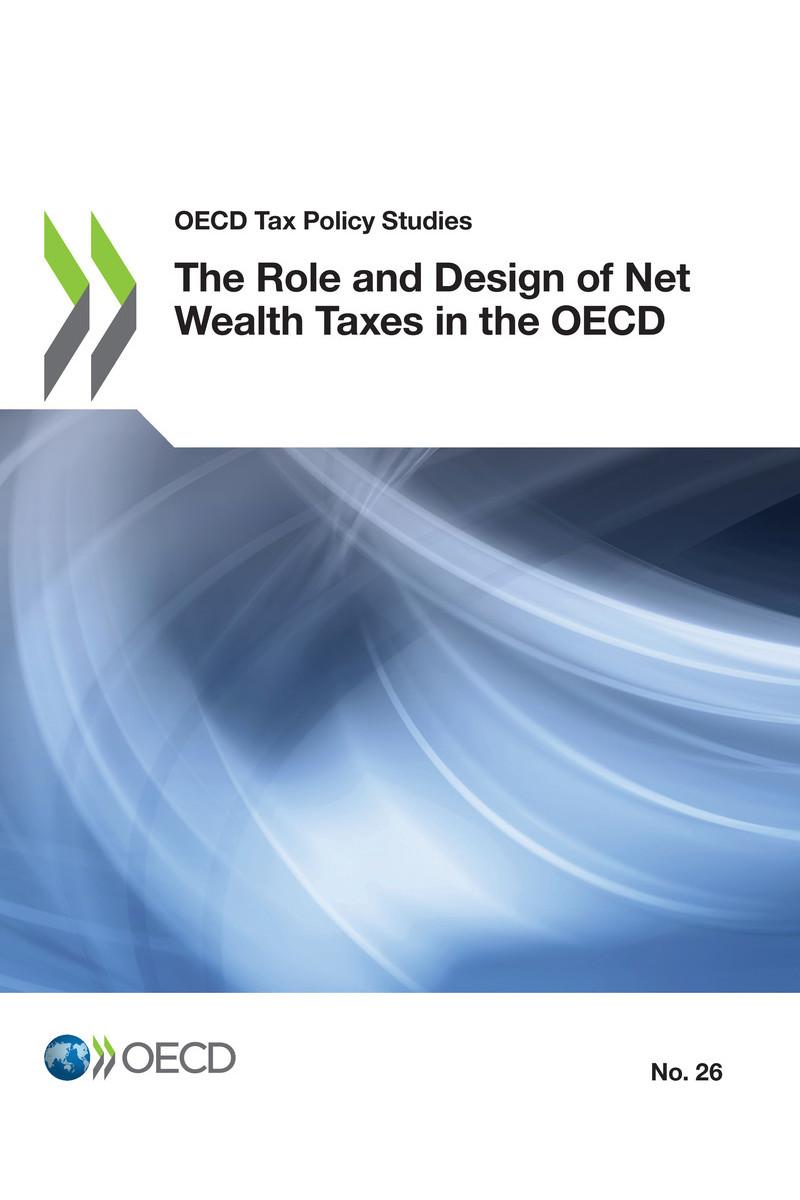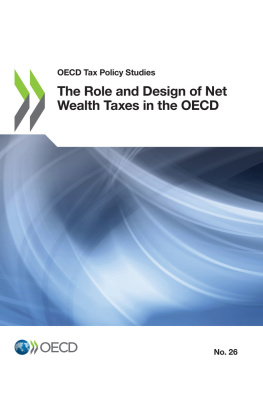coll. - The Role and Design of Net Wealth Taxes in the OECD
Here you can read online coll. - The Role and Design of Net Wealth Taxes in the OECD full text of the book (entire story) in english for free. Download pdf and epub, get meaning, cover and reviews about this ebook. City: Paris, year: 2018, publisher: Organization for Economic Cooperation and Development, genre: Politics. Description of the work, (preface) as well as reviews are available. Best literature library LitArk.com created for fans of good reading and offers a wide selection of genres:
Romance novel
Science fiction
Adventure
Detective
Science
History
Home and family
Prose
Art
Politics
Computer
Non-fiction
Religion
Business
Children
Humor
Choose a favorite category and find really read worthwhile books. Enjoy immersion in the world of imagination, feel the emotions of the characters or learn something new for yourself, make an fascinating discovery.
The Role and Design of Net Wealth Taxes in the OECD: summary, description and annotation
We offer to read an annotation, description, summary or preface (depends on what the author of the book "The Role and Design of Net Wealth Taxes in the OECD" wrote himself). If you haven't found the necessary information about the book — write in the comments, we will try to find it.
The Role and Design of Net Wealth Taxes in the OECD — read online for free the complete book (whole text) full work
Below is the text of the book, divided by pages. System saving the place of the last page read, allows you to conveniently read the book "The Role and Design of Net Wealth Taxes in the OECD" online for free, without having to search again every time where you left off. Put a bookmark, and you can go to the page where you finished reading at any time.
Font size:
Interval:
Bookmark:

OECD (2018), The Role and Design of Net Wealth Taxes in the OECD , OECD Tax Policy Studies, OECD Publishing, Paris.
http://dx.doi.org/10.1787/9789264290303-en
This report examines and assesses the current and historical use of net wealth taxes, defined as recurrent taxes on individual net assets, in OECD countries. It provides background on the use of wealth taxes over time in OECD countries as well as on trends in income and wealth inequality. It then assesses the case for and against the use of a net wealth tax to raise revenues and reduce inequality, based on efficiency, equity and tax administration considerations. The effects of personal capital income taxes and taxes on wealth transfers are also discussed to understand how these taxes interact with net wealth taxes. Finally, the report looks at practical tax design issues and shows that the way a net wealth tax is designed can have a significant impact on the effectiveness and fairness of the tax. The report concludes with a number of practical tax policy recommendations regarding net wealth taxes.
This report complements recent OECD work on the taxation of household savings and, more broadly, on tax design for inclusive growth. The report also paves the way for future work focusing, among other areas, on the design of inheritance and capital gains taxes, as well as on the potential use of wealth-testing for broader tax and benefit purposes.
This report was produced by the Tax Policy and Statistics Division of the OECD Centre for Tax Policy and Administration with the financial support of the Korea Institute of Public Finance (KIPF).
The report was written by Sarah Perret. Guidance and critical input were provided by Bert Brys. The report has also benefited from contributions by Pierce OReilly and Alastair Thomas and helpful comments by David Bradbury, Head of the Tax Policy and Statistics Division at the OECD. The author would also like to thank the delegates of the Working Party No.2 on Tax Policy Analysis and Tax Statistics for their responses to the OECD Questionnaire on Current and Historical Net Wealth Taxes and for their feedback on the report. Raphalle Gernos assistance with background research and Bethany Millar-Powells help with graphs and tables are also gratefully acknowledged. Carrie Tyler assisted with the publication process. Violet Sochay provided administrative assistance.
Net wealth taxes are far less widespread than they used to be in the OECD but there has recently been a renewed interest in wealth taxation. While 12 countries had net wealth taxes in 1990, there were only four OECD countries that still levied recurrent taxes on individuals net wealth in 2017. Decisions to repeal net wealth taxes have often been justified by efficiency and administrative concerns and by the observation that net wealth taxes have frequently failed to meet their redistributive goals. The revenues collected from net wealth taxes have also, with a few exceptions, been very low. More recently, however, some countries have shown a renewed interest in net wealth taxes as a way to raise revenues and address wealth inequality.
This report seeks to answer four main questions:
Is there a rationale for addressing wealth inequality through the tax system?
If so, is a net wealth tax the most appropriate instrument to address wealth inequality?
What have been the practical experiences of countries that currently have or previously had a net wealth tax?
Where a country has decided to implement a net wealth tax, how should it be designed to maximise efficiency and equity and minimise tax administration and compliance costs?
The report argues that there is a strong case for addressing wealth inequality through the tax system. Wealth inequality is far greater than income inequality, and there is some evidence suggesting that wealth inequality has increased in recent decades. In addition, wealth accumulation operates in a self-reinforcing way and is likely to increase in the absence of taxation. High earners are able to save more, meaning that they are able to invest more and ultimately accumulate more wealth. Moreover, investment returns tend to increase with wealth, largely because wealthy taxpayers are in a better position to invest in riskier assets and generally have higher levels of financial education, expertise and access to professional investment advice.
While the tax system should help address wealth inequality, the question is whether a wealth tax is the most effective way to do so. The report assesses the case for and against net wealth taxes, looking at efficiency, equity and administrative arguments. It also compares the effects of net wealth taxes with personal capital income taxes and taxes on wealth transfers.
Overall, the report concludes that from both an efficiency and equity perspective, there are limited arguments for having a net wealth tax in addition to broad-based personal capital income taxes and well-designed inheritance and gift taxes. While there are important similarities between personal capital income taxes and net wealth taxes, the report shows that net wealth taxes tend to be more distortive and less equitable. This is largely because they are imposed irrespective of the actual returns that taxpayers earn on their assets. The report also argues that capital income taxes alone will most likely not be enough to address wealth inequality and suggests the need to complement capital income taxes with a form of wealth taxation. The report finds that there is a strong case for an accompanying inheritance tax on efficiency, equity and administrative grounds.
Font size:
Interval:
Bookmark:
Similar books «The Role and Design of Net Wealth Taxes in the OECD»
Look at similar books to The Role and Design of Net Wealth Taxes in the OECD. We have selected literature similar in name and meaning in the hope of providing readers with more options to find new, interesting, not yet read works.
Discussion, reviews of the book The Role and Design of Net Wealth Taxes in the OECD and just readers' own opinions. Leave your comments, write what you think about the work, its meaning or the main characters. Specify what exactly you liked and what you didn't like, and why you think so.















